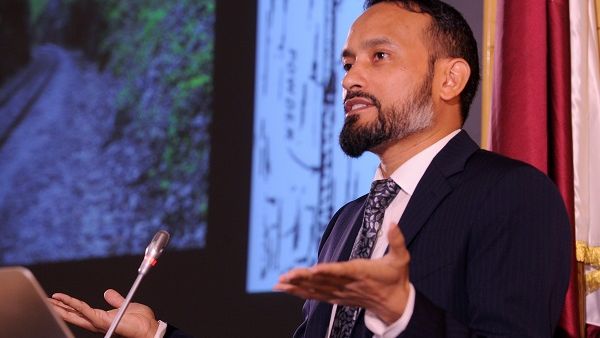Frontal Lobe’s Role in Risk-Taking Explained at WCM-Q Grand Rounds

The role of the brain’s frontal lobe in adolescent risk-taking behavior was discussed at the latest installment of Weill Cornell Medicine-Qatar’s (WCM-Q) Grand Rounds.
Expert speaker Dr. Omar Mendoza Mahmood, WCM-Q assistant professor of psychology in clinical psychiatry, explained how the structure and size of the human brain makes us unique as a species
He said: “One of the defining features of human physiology is this giant space above our eyebrows that accommodates this large area of cerebral cortex called the frontal lobe. No other species has such a large amount of space allocated to this type of structure. So how does it influence behavior?”
Dr. Mahmood, who is also a clinical neuropsychologist at Sidra Medicine, pointed to the much-studied case of Phineas Gage, a railroad worker who suffered a traumatic brain injury in Vermont, USA in 1848 when an explosion drove an iron rod through his skull. Incredibly, Gage survived the accident, but a huge area of his frontal lobe was completely destroyed and his personality changed dramatically. Where he had been conscientious, smart, charismatic and career-focused he was now impulsive, rude, prone to fits of anger and made poor financial and career decisions.
Dr. Mahmood said: “Many have theorized that Gage’s frontal lobe functions were destroyed or impaired and this meant he was unable to function at the level he was before. He was simply no longer the same person. The interesting thing is you don’t really need the frontal lobe to survive, you don’t really need it to function as a human being in the very basic sense, but it does impair and take away a lot of your abilities if it is damaged. Some of these abilities are your ability to control your behavior, make good decisions, and inhibit yourself.”
Given that in the adolescent brain the frontal lobe is not yet fully developed, researchers have drawn parallels between Gage’s behavior and the tendency among adolescents to engage in risky, impulsive behavior with little regard for the possible consequences, explained Dr. Mahmood.
“Why is this type of impulsive, risky behavior so common in the late teens and early twenties? Well, for young adults, the brain is still a work in progress, and in the cultural context of the modern, developed world, this can continue for a long period from around age 18 to 25, a period known as ‘emerging adulthood’.”
Dr. Mahmood then explained that as young adults gain experience and responsibilities, the frontal lobe becomes more developed and better connected to other parts of the brain. They develop improved ability to respond rationally to situations, are more likely to think about the consequences of their actions and less likely to take risks, he said.
The lecture was accredited locally by the Qatar Council for Healthcare Practitioners-Accreditation Department (QCHP-AD) and internationally by the Accreditation Council for Continuing Medical Education (ACCME).
Background Information
Weill Cornell Medical College in Qatar
Weill Cornell Medicine - Qatar is a partnership between Cornell University and Qatar Foundation. It offers a comprehensive six-year medical program leading to the Cornell University M.D. degree with teaching by Cornell and Weill Cornell faculty and by physicians at Hamad Medical Corporation (HMC), Aspetar Orthopedic and Sports Medicine Hospital, the Primary Health Care Corporation, the Feto Maternal Center, and Sidra Medicine, who hold Weill Cornell appointments. Through its biomedical research program, WCM-Q is building a sustainable research community in Qatar while advancing basic science and clinical research. Through its medical college, WCM-Q seeks to provide the finest education possible for medical students, to improve health care both now and for future generations, and to provide high quality health care to the Qatari population.






